Impact of Culture, Power, and Motivation on A David & Co's Performance
VerifiedAdded on 2020/11/23
|17
|4812
|52
Report
AI Summary
This report provides a comprehensive analysis of organisational behaviour, focusing on the case study of A David & Co Limited, a food and beverage company. The report examines the impact of organisational culture, power dynamics, and politics on both individual and team performance, highlighting the influence of task culture. It delves into content and process theories of motivation, including Maslow's hierarchy of needs, Herzberg's two-factor theory, equity theory, goal-setting theory, and expectancy theory, and how A David & Co applies these theories to motivate its employees. The report also explores the significance of positive power and politics in fostering a healthy workplace environment and the detrimental effects of negative power dynamics. Furthermore, it discusses the importance of employee involvement, fair treatment, and clear goal setting in enhancing employee satisfaction and productivity. The report concludes by emphasizing the strong relationship between culture, power, politics, and motivation, and their combined effect on overall organisational success and employee retention.
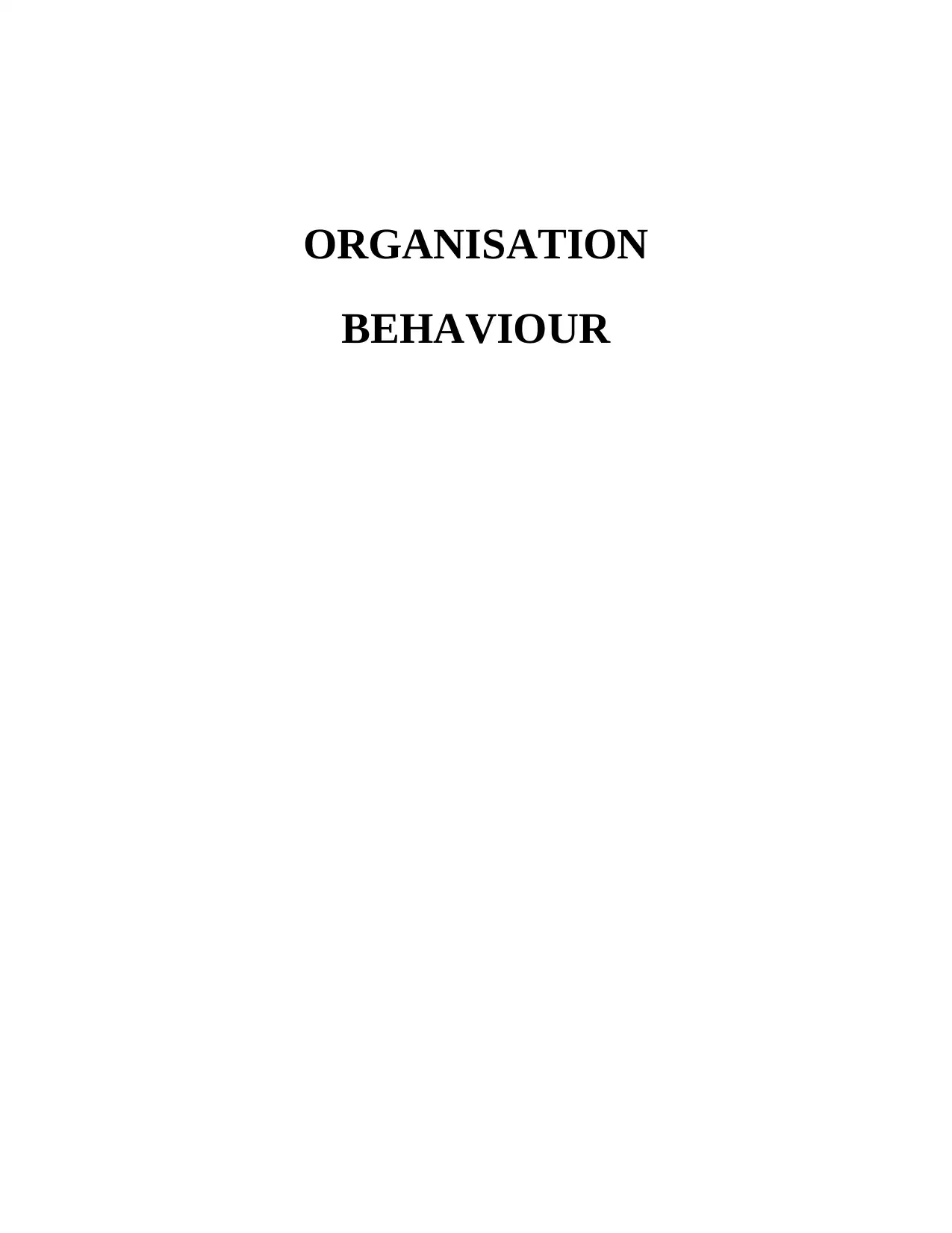
ORGANISATION
BEHAVIOUR
BEHAVIOUR
Paraphrase This Document
Need a fresh take? Get an instant paraphrase of this document with our AI Paraphraser
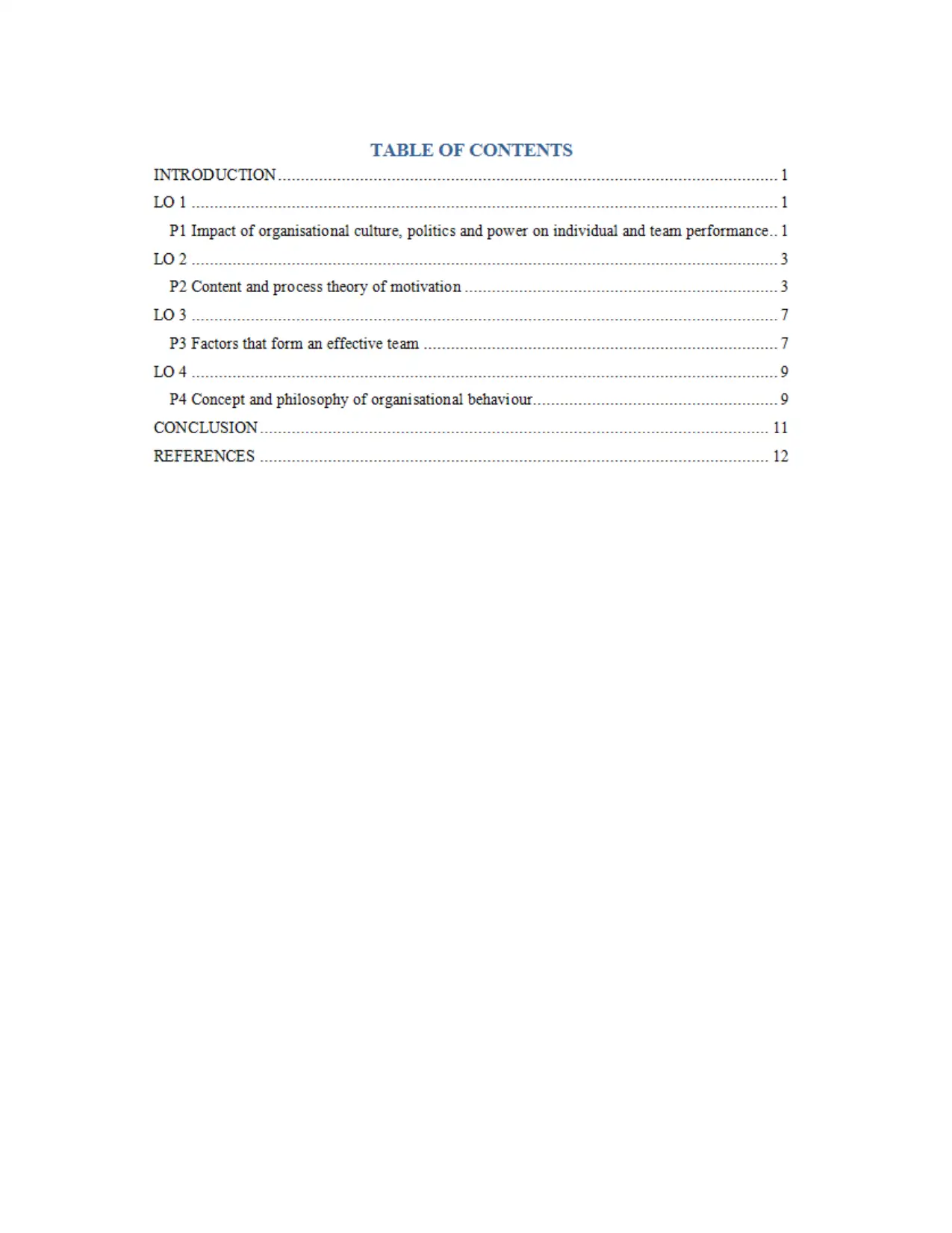
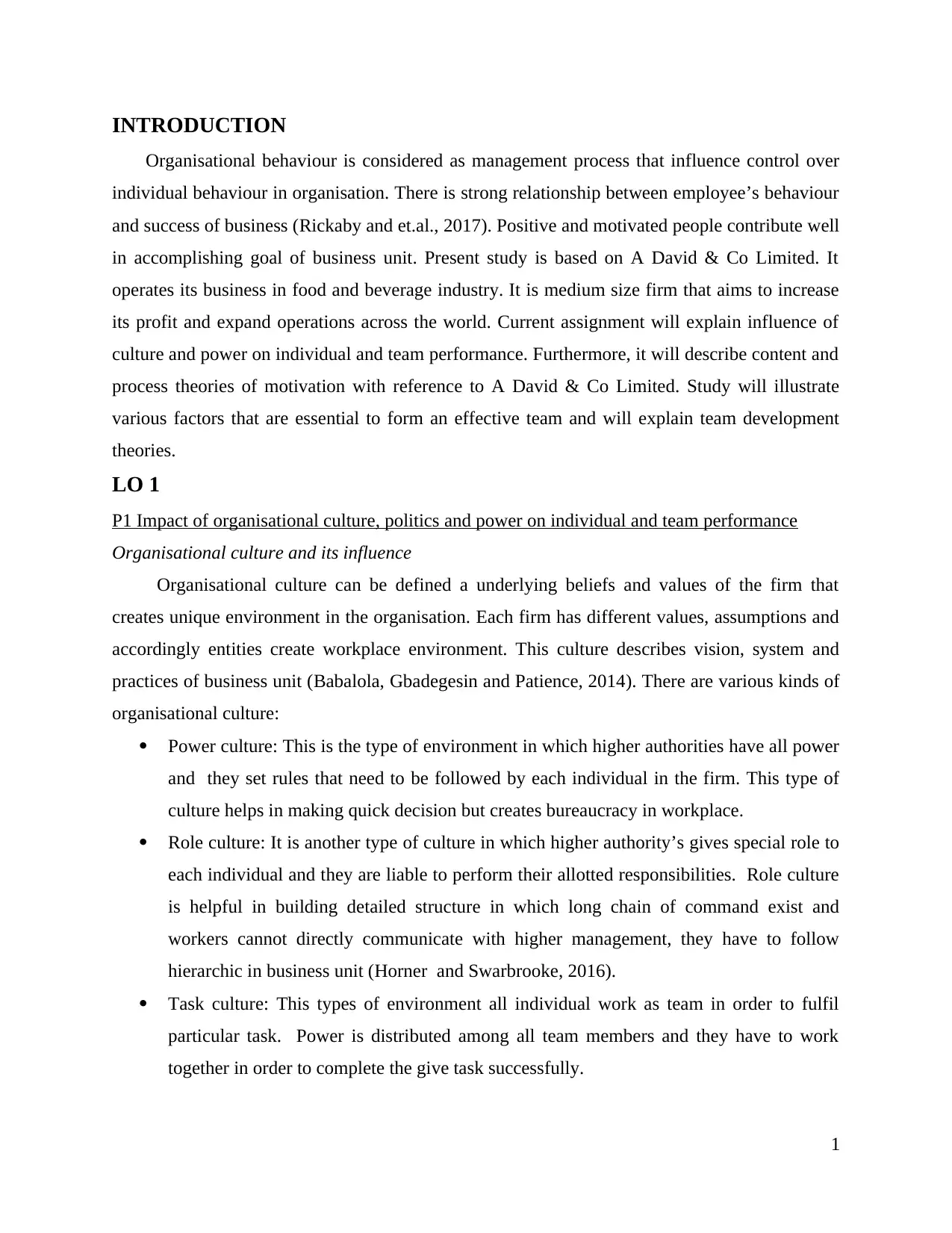
INTRODUCTION
Organisational behaviour is considered as management process that influence control over
individual behaviour in organisation. There is strong relationship between employee’s behaviour
and success of business (Rickaby and et.al., 2017). Positive and motivated people contribute well
in accomplishing goal of business unit. Present study is based on A David & Co Limited. It
operates its business in food and beverage industry. It is medium size firm that aims to increase
its profit and expand operations across the world. Current assignment will explain influence of
culture and power on individual and team performance. Furthermore, it will describe content and
process theories of motivation with reference to A David & Co Limited. Study will illustrate
various factors that are essential to form an effective team and will explain team development
theories.
LO 1
P1 Impact of organisational culture, politics and power on individual and team performance
Organisational culture and its influence
Organisational culture can be defined a underlying beliefs and values of the firm that
creates unique environment in the organisation. Each firm has different values, assumptions and
accordingly entities create workplace environment. This culture describes vision, system and
practices of business unit (Babalola, Gbadegesin and Patience, 2014). There are various kinds of
organisational culture:
Power culture: This is the type of environment in which higher authorities have all power
and they set rules that need to be followed by each individual in the firm. This type of
culture helps in making quick decision but creates bureaucracy in workplace.
Role culture: It is another type of culture in which higher authority’s gives special role to
each individual and they are liable to perform their allotted responsibilities. Role culture
is helpful in building detailed structure in which long chain of command exist and
workers cannot directly communicate with higher management, they have to follow
hierarchic in business unit (Horner and Swarbrooke, 2016).
Task culture: This types of environment all individual work as team in order to fulfil
particular task. Power is distributed among all team members and they have to work
together in order to complete the give task successfully.
1
Organisational behaviour is considered as management process that influence control over
individual behaviour in organisation. There is strong relationship between employee’s behaviour
and success of business (Rickaby and et.al., 2017). Positive and motivated people contribute well
in accomplishing goal of business unit. Present study is based on A David & Co Limited. It
operates its business in food and beverage industry. It is medium size firm that aims to increase
its profit and expand operations across the world. Current assignment will explain influence of
culture and power on individual and team performance. Furthermore, it will describe content and
process theories of motivation with reference to A David & Co Limited. Study will illustrate
various factors that are essential to form an effective team and will explain team development
theories.
LO 1
P1 Impact of organisational culture, politics and power on individual and team performance
Organisational culture and its influence
Organisational culture can be defined a underlying beliefs and values of the firm that
creates unique environment in the organisation. Each firm has different values, assumptions and
accordingly entities create workplace environment. This culture describes vision, system and
practices of business unit (Babalola, Gbadegesin and Patience, 2014). There are various kinds of
organisational culture:
Power culture: This is the type of environment in which higher authorities have all power
and they set rules that need to be followed by each individual in the firm. This type of
culture helps in making quick decision but creates bureaucracy in workplace.
Role culture: It is another type of culture in which higher authority’s gives special role to
each individual and they are liable to perform their allotted responsibilities. Role culture
is helpful in building detailed structure in which long chain of command exist and
workers cannot directly communicate with higher management, they have to follow
hierarchic in business unit (Horner and Swarbrooke, 2016).
Task culture: This types of environment all individual work as team in order to fulfil
particular task. Power is distributed among all team members and they have to work
together in order to complete the give task successfully.
1
⊘ This is a preview!⊘
Do you want full access?
Subscribe today to unlock all pages.

Trusted by 1+ million students worldwide
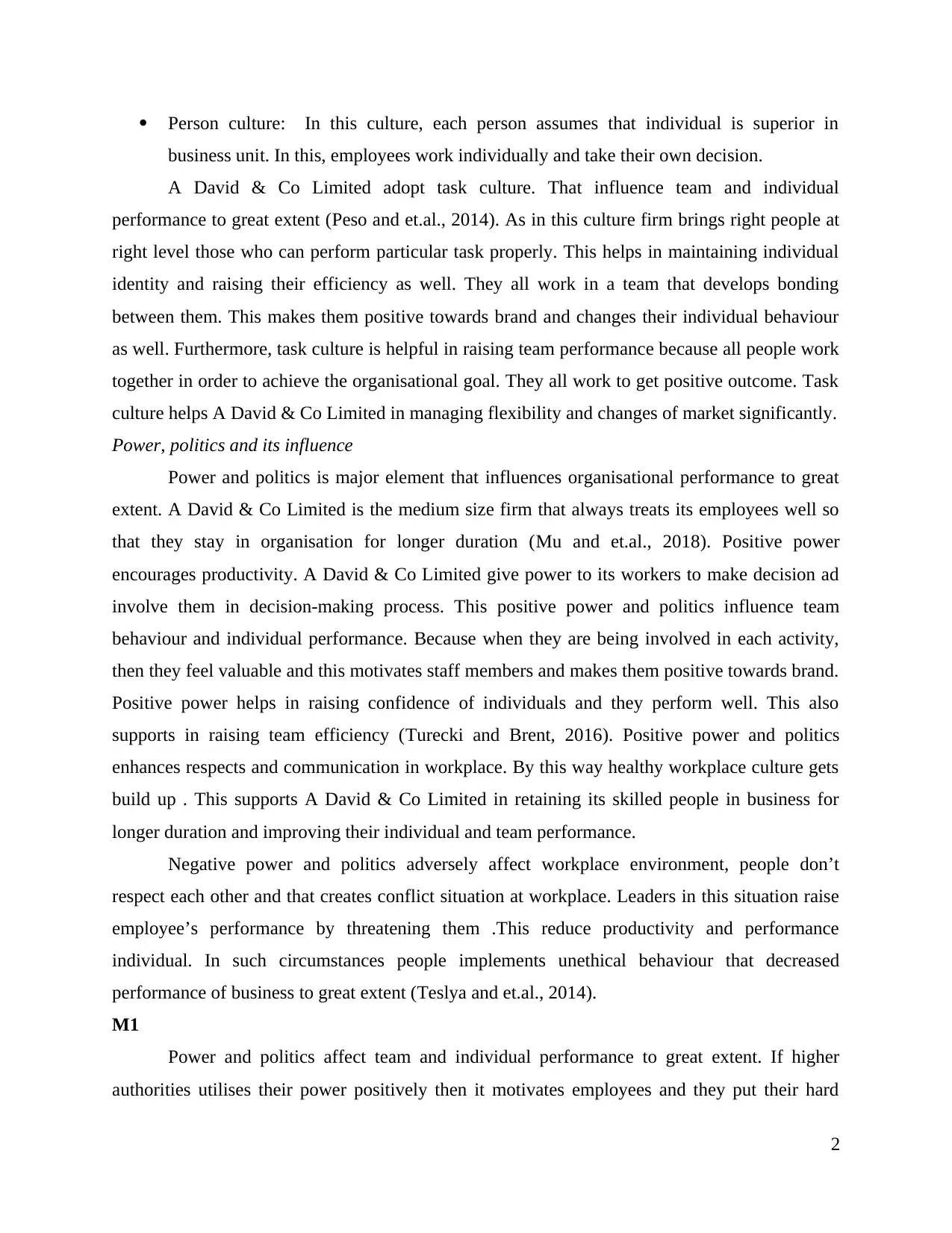
Person culture: In this culture, each person assumes that individual is superior in
business unit. In this, employees work individually and take their own decision.
A David & Co Limited adopt task culture. That influence team and individual
performance to great extent (Peso and et.al., 2014). As in this culture firm brings right people at
right level those who can perform particular task properly. This helps in maintaining individual
identity and raising their efficiency as well. They all work in a team that develops bonding
between them. This makes them positive towards brand and changes their individual behaviour
as well. Furthermore, task culture is helpful in raising team performance because all people work
together in order to achieve the organisational goal. They all work to get positive outcome. Task
culture helps A David & Co Limited in managing flexibility and changes of market significantly.
Power, politics and its influence
Power and politics is major element that influences organisational performance to great
extent. A David & Co Limited is the medium size firm that always treats its employees well so
that they stay in organisation for longer duration (Mu and et.al., 2018). Positive power
encourages productivity. A David & Co Limited give power to its workers to make decision ad
involve them in decision-making process. This positive power and politics influence team
behaviour and individual performance. Because when they are being involved in each activity,
then they feel valuable and this motivates staff members and makes them positive towards brand.
Positive power helps in raising confidence of individuals and they perform well. This also
supports in raising team efficiency (Turecki and Brent, 2016). Positive power and politics
enhances respects and communication in workplace. By this way healthy workplace culture gets
build up . This supports A David & Co Limited in retaining its skilled people in business for
longer duration and improving their individual and team performance.
Negative power and politics adversely affect workplace environment, people don’t
respect each other and that creates conflict situation at workplace. Leaders in this situation raise
employee’s performance by threatening them .This reduce productivity and performance
individual. In such circumstances people implements unethical behaviour that decreased
performance of business to great extent (Teslya and et.al., 2014).
M1
Power and politics affect team and individual performance to great extent. If higher
authorities utilises their power positively then it motivates employees and they put their hard
2
business unit. In this, employees work individually and take their own decision.
A David & Co Limited adopt task culture. That influence team and individual
performance to great extent (Peso and et.al., 2014). As in this culture firm brings right people at
right level those who can perform particular task properly. This helps in maintaining individual
identity and raising their efficiency as well. They all work in a team that develops bonding
between them. This makes them positive towards brand and changes their individual behaviour
as well. Furthermore, task culture is helpful in raising team performance because all people work
together in order to achieve the organisational goal. They all work to get positive outcome. Task
culture helps A David & Co Limited in managing flexibility and changes of market significantly.
Power, politics and its influence
Power and politics is major element that influences organisational performance to great
extent. A David & Co Limited is the medium size firm that always treats its employees well so
that they stay in organisation for longer duration (Mu and et.al., 2018). Positive power
encourages productivity. A David & Co Limited give power to its workers to make decision ad
involve them in decision-making process. This positive power and politics influence team
behaviour and individual performance. Because when they are being involved in each activity,
then they feel valuable and this motivates staff members and makes them positive towards brand.
Positive power helps in raising confidence of individuals and they perform well. This also
supports in raising team efficiency (Turecki and Brent, 2016). Positive power and politics
enhances respects and communication in workplace. By this way healthy workplace culture gets
build up . This supports A David & Co Limited in retaining its skilled people in business for
longer duration and improving their individual and team performance.
Negative power and politics adversely affect workplace environment, people don’t
respect each other and that creates conflict situation at workplace. Leaders in this situation raise
employee’s performance by threatening them .This reduce productivity and performance
individual. In such circumstances people implements unethical behaviour that decreased
performance of business to great extent (Teslya and et.al., 2014).
M1
Power and politics affect team and individual performance to great extent. If higher
authorities utilises their power positively then it motivates employees and they put their hard
2
Paraphrase This Document
Need a fresh take? Get an instant paraphrase of this document with our AI Paraphraser
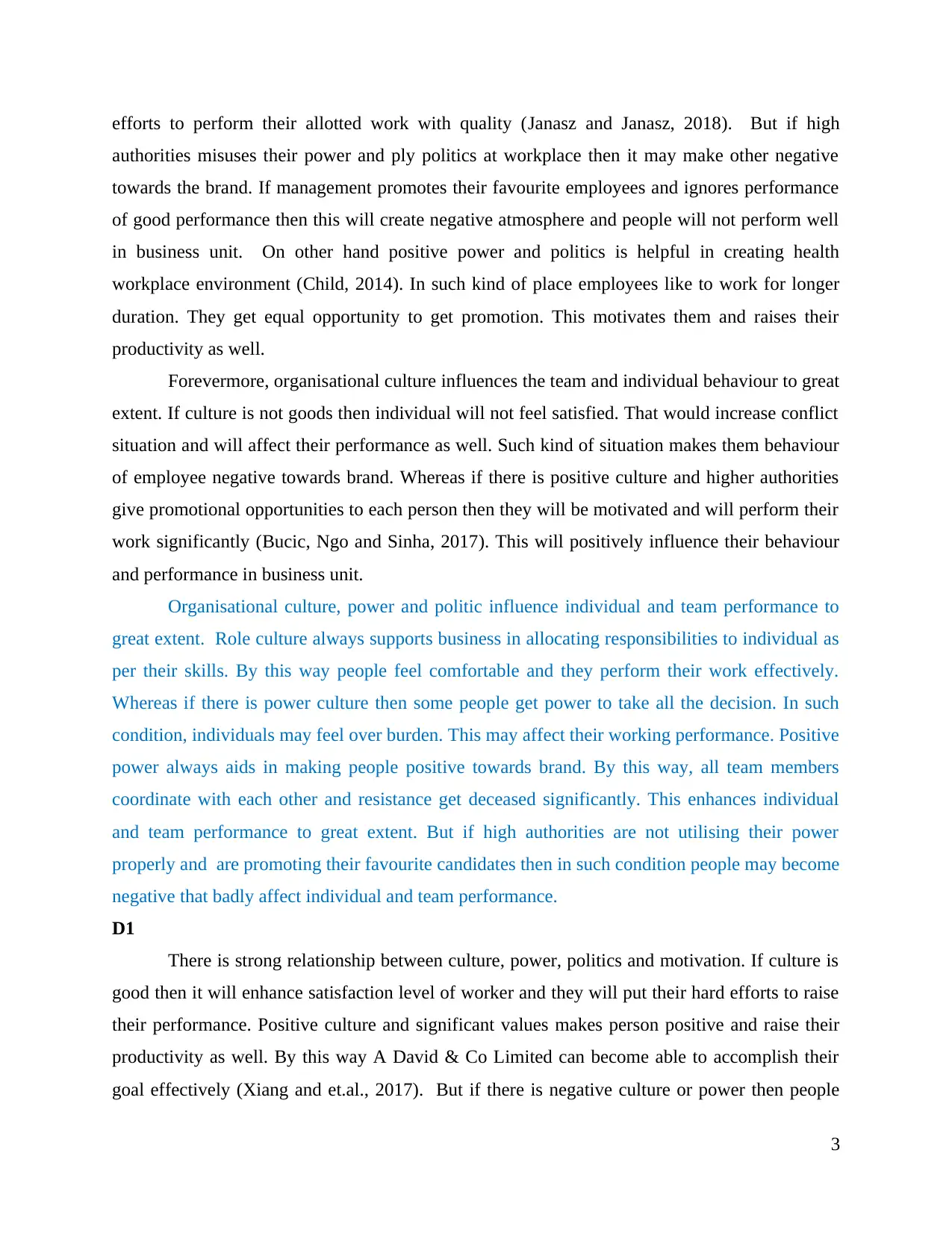
efforts to perform their allotted work with quality (Janasz and Janasz, 2018). But if high
authorities misuses their power and ply politics at workplace then it may make other negative
towards the brand. If management promotes their favourite employees and ignores performance
of good performance then this will create negative atmosphere and people will not perform well
in business unit. On other hand positive power and politics is helpful in creating health
workplace environment (Child, 2014). In such kind of place employees like to work for longer
duration. They get equal opportunity to get promotion. This motivates them and raises their
productivity as well.
Forevermore, organisational culture influences the team and individual behaviour to great
extent. If culture is not goods then individual will not feel satisfied. That would increase conflict
situation and will affect their performance as well. Such kind of situation makes them behaviour
of employee negative towards brand. Whereas if there is positive culture and higher authorities
give promotional opportunities to each person then they will be motivated and will perform their
work significantly (Bucic, Ngo and Sinha, 2017). This will positively influence their behaviour
and performance in business unit.
Organisational culture, power and politic influence individual and team performance to
great extent. Role culture always supports business in allocating responsibilities to individual as
per their skills. By this way people feel comfortable and they perform their work effectively.
Whereas if there is power culture then some people get power to take all the decision. In such
condition, individuals may feel over burden. This may affect their working performance. Positive
power always aids in making people positive towards brand. By this way, all team members
coordinate with each other and resistance get deceased significantly. This enhances individual
and team performance to great extent. But if high authorities are not utilising their power
properly and are promoting their favourite candidates then in such condition people may become
negative that badly affect individual and team performance.
D1
There is strong relationship between culture, power, politics and motivation. If culture is
good then it will enhance satisfaction level of worker and they will put their hard efforts to raise
their performance. Positive culture and significant values makes person positive and raise their
productivity as well. By this way A David & Co Limited can become able to accomplish their
goal effectively (Xiang and et.al., 2017). But if there is negative culture or power then people
3
authorities misuses their power and ply politics at workplace then it may make other negative
towards the brand. If management promotes their favourite employees and ignores performance
of good performance then this will create negative atmosphere and people will not perform well
in business unit. On other hand positive power and politics is helpful in creating health
workplace environment (Child, 2014). In such kind of place employees like to work for longer
duration. They get equal opportunity to get promotion. This motivates them and raises their
productivity as well.
Forevermore, organisational culture influences the team and individual behaviour to great
extent. If culture is not goods then individual will not feel satisfied. That would increase conflict
situation and will affect their performance as well. Such kind of situation makes them behaviour
of employee negative towards brand. Whereas if there is positive culture and higher authorities
give promotional opportunities to each person then they will be motivated and will perform their
work significantly (Bucic, Ngo and Sinha, 2017). This will positively influence their behaviour
and performance in business unit.
Organisational culture, power and politic influence individual and team performance to
great extent. Role culture always supports business in allocating responsibilities to individual as
per their skills. By this way people feel comfortable and they perform their work effectively.
Whereas if there is power culture then some people get power to take all the decision. In such
condition, individuals may feel over burden. This may affect their working performance. Positive
power always aids in making people positive towards brand. By this way, all team members
coordinate with each other and resistance get deceased significantly. This enhances individual
and team performance to great extent. But if high authorities are not utilising their power
properly and are promoting their favourite candidates then in such condition people may become
negative that badly affect individual and team performance.
D1
There is strong relationship between culture, power, politics and motivation. If culture is
good then it will enhance satisfaction level of worker and they will put their hard efforts to raise
their performance. Positive culture and significant values makes person positive and raise their
productivity as well. By this way A David & Co Limited can become able to accomplish their
goal effectively (Xiang and et.al., 2017). But if there is negative culture or power then people
3
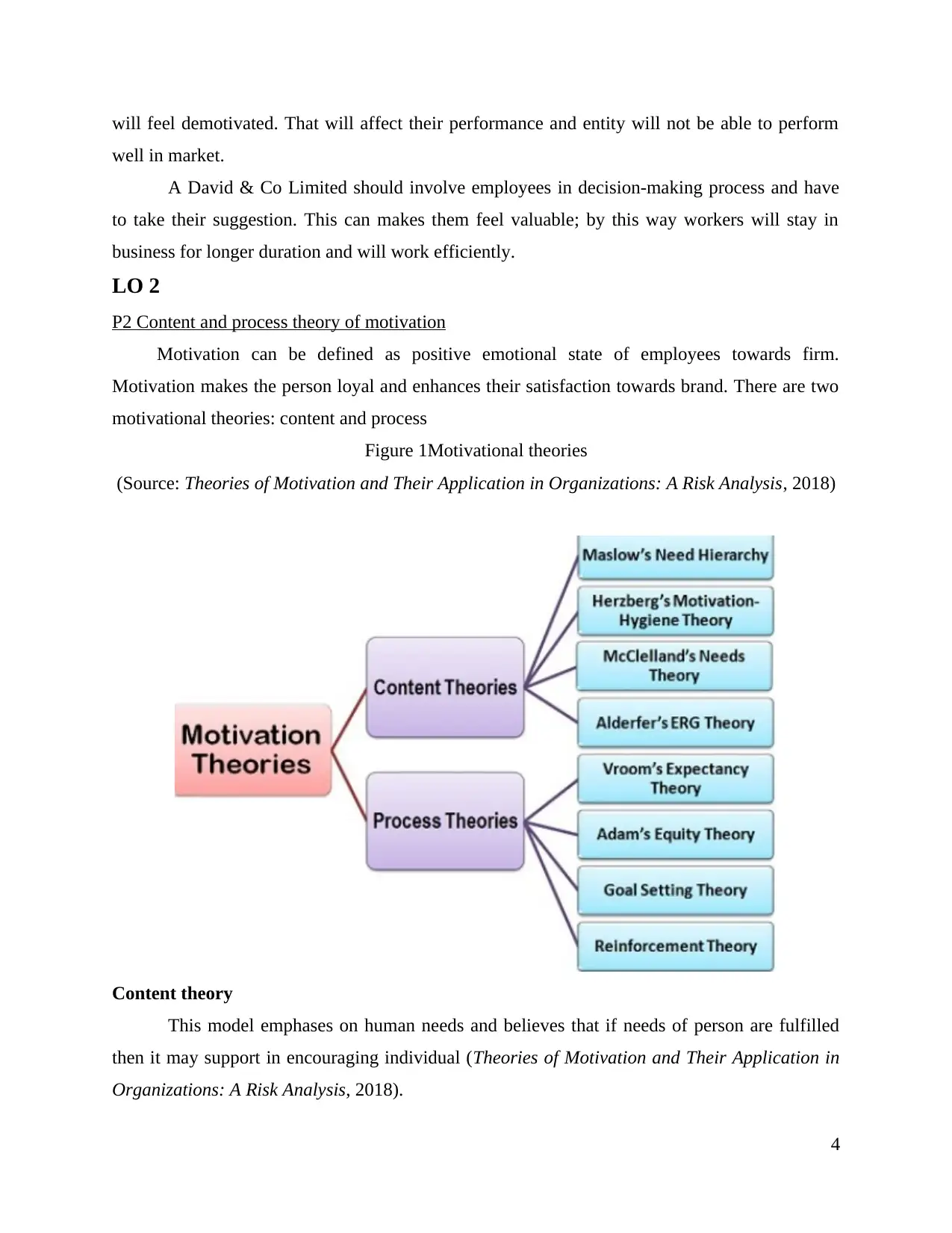
will feel demotivated. That will affect their performance and entity will not be able to perform
well in market.
A David & Co Limited should involve employees in decision-making process and have
to take their suggestion. This can makes them feel valuable; by this way workers will stay in
business for longer duration and will work efficiently.
LO 2
P2 Content and process theory of motivation
Motivation can be defined as positive emotional state of employees towards firm.
Motivation makes the person loyal and enhances their satisfaction towards brand. There are two
motivational theories: content and process
Figure 1Motivational theories
(Source: Theories of Motivation and Their Application in Organizations: A Risk Analysis, 2018)
Content theory
This model emphases on human needs and believes that if needs of person are fulfilled
then it may support in encouraging individual (Theories of Motivation and Their Application in
Organizations: A Risk Analysis, 2018).
4
well in market.
A David & Co Limited should involve employees in decision-making process and have
to take their suggestion. This can makes them feel valuable; by this way workers will stay in
business for longer duration and will work efficiently.
LO 2
P2 Content and process theory of motivation
Motivation can be defined as positive emotional state of employees towards firm.
Motivation makes the person loyal and enhances their satisfaction towards brand. There are two
motivational theories: content and process
Figure 1Motivational theories
(Source: Theories of Motivation and Their Application in Organizations: A Risk Analysis, 2018)
Content theory
This model emphases on human needs and believes that if needs of person are fulfilled
then it may support in encouraging individual (Theories of Motivation and Their Application in
Organizations: A Risk Analysis, 2018).
4
⊘ This is a preview!⊘
Do you want full access?
Subscribe today to unlock all pages.

Trusted by 1+ million students worldwide
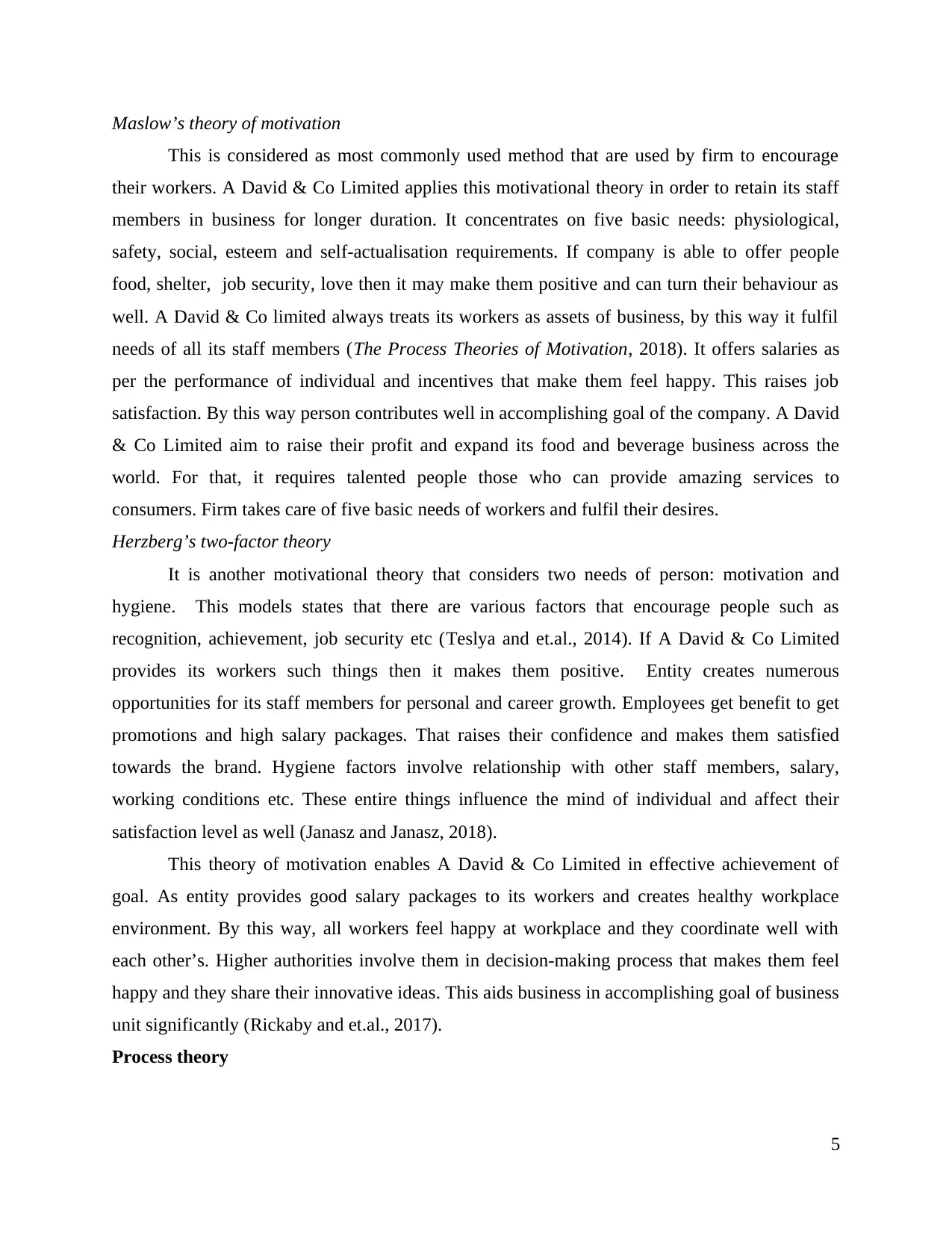
Maslow’s theory of motivation
This is considered as most commonly used method that are used by firm to encourage
their workers. A David & Co Limited applies this motivational theory in order to retain its staff
members in business for longer duration. It concentrates on five basic needs: physiological,
safety, social, esteem and self-actualisation requirements. If company is able to offer people
food, shelter, job security, love then it may make them positive and can turn their behaviour as
well. A David & Co limited always treats its workers as assets of business, by this way it fulfil
needs of all its staff members (The Process Theories of Motivation, 2018). It offers salaries as
per the performance of individual and incentives that make them feel happy. This raises job
satisfaction. By this way person contributes well in accomplishing goal of the company. A David
& Co Limited aim to raise their profit and expand its food and beverage business across the
world. For that, it requires talented people those who can provide amazing services to
consumers. Firm takes care of five basic needs of workers and fulfil their desires.
Herzberg’s two-factor theory
It is another motivational theory that considers two needs of person: motivation and
hygiene. This models states that there are various factors that encourage people such as
recognition, achievement, job security etc (Teslya and et.al., 2014). If A David & Co Limited
provides its workers such things then it makes them positive. Entity creates numerous
opportunities for its staff members for personal and career growth. Employees get benefit to get
promotions and high salary packages. That raises their confidence and makes them satisfied
towards the brand. Hygiene factors involve relationship with other staff members, salary,
working conditions etc. These entire things influence the mind of individual and affect their
satisfaction level as well (Janasz and Janasz, 2018).
This theory of motivation enables A David & Co Limited in effective achievement of
goal. As entity provides good salary packages to its workers and creates healthy workplace
environment. By this way, all workers feel happy at workplace and they coordinate well with
each other’s. Higher authorities involve them in decision-making process that makes them feel
happy and they share their innovative ideas. This aids business in accomplishing goal of business
unit significantly (Rickaby and et.al., 2017).
Process theory
5
This is considered as most commonly used method that are used by firm to encourage
their workers. A David & Co Limited applies this motivational theory in order to retain its staff
members in business for longer duration. It concentrates on five basic needs: physiological,
safety, social, esteem and self-actualisation requirements. If company is able to offer people
food, shelter, job security, love then it may make them positive and can turn their behaviour as
well. A David & Co limited always treats its workers as assets of business, by this way it fulfil
needs of all its staff members (The Process Theories of Motivation, 2018). It offers salaries as
per the performance of individual and incentives that make them feel happy. This raises job
satisfaction. By this way person contributes well in accomplishing goal of the company. A David
& Co Limited aim to raise their profit and expand its food and beverage business across the
world. For that, it requires talented people those who can provide amazing services to
consumers. Firm takes care of five basic needs of workers and fulfil their desires.
Herzberg’s two-factor theory
It is another motivational theory that considers two needs of person: motivation and
hygiene. This models states that there are various factors that encourage people such as
recognition, achievement, job security etc (Teslya and et.al., 2014). If A David & Co Limited
provides its workers such things then it makes them positive. Entity creates numerous
opportunities for its staff members for personal and career growth. Employees get benefit to get
promotions and high salary packages. That raises their confidence and makes them satisfied
towards the brand. Hygiene factors involve relationship with other staff members, salary,
working conditions etc. These entire things influence the mind of individual and affect their
satisfaction level as well (Janasz and Janasz, 2018).
This theory of motivation enables A David & Co Limited in effective achievement of
goal. As entity provides good salary packages to its workers and creates healthy workplace
environment. By this way, all workers feel happy at workplace and they coordinate well with
each other’s. Higher authorities involve them in decision-making process that makes them feel
happy and they share their innovative ideas. This aids business in accomplishing goal of business
unit significantly (Rickaby and et.al., 2017).
Process theory
5
Paraphrase This Document
Need a fresh take? Get an instant paraphrase of this document with our AI Paraphraser
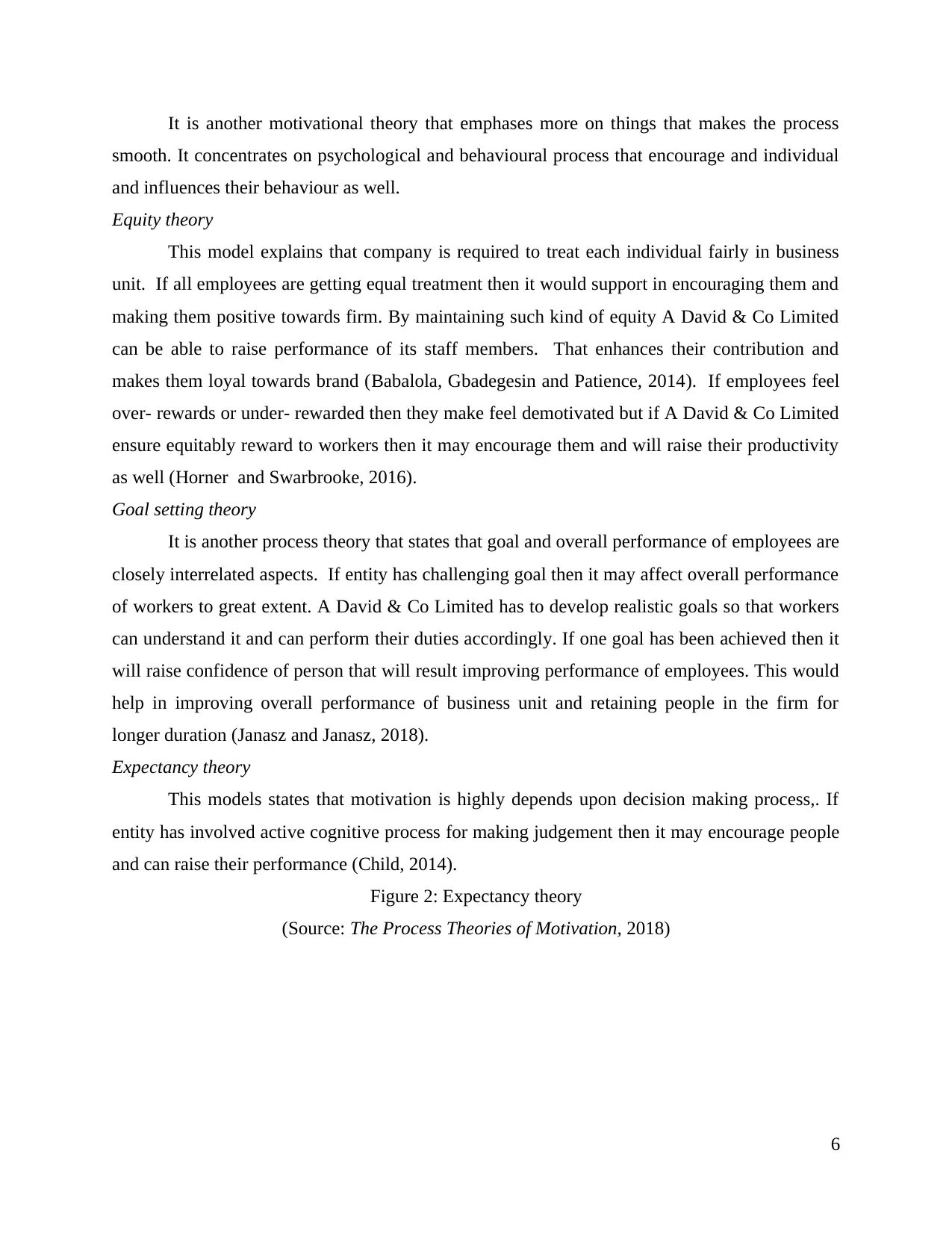
It is another motivational theory that emphases more on things that makes the process
smooth. It concentrates on psychological and behavioural process that encourage and individual
and influences their behaviour as well.
Equity theory
This model explains that company is required to treat each individual fairly in business
unit. If all employees are getting equal treatment then it would support in encouraging them and
making them positive towards firm. By maintaining such kind of equity A David & Co Limited
can be able to raise performance of its staff members. That enhances their contribution and
makes them loyal towards brand (Babalola, Gbadegesin and Patience, 2014). If employees feel
over- rewards or under- rewarded then they make feel demotivated but if A David & Co Limited
ensure equitably reward to workers then it may encourage them and will raise their productivity
as well (Horner and Swarbrooke, 2016).
Goal setting theory
It is another process theory that states that goal and overall performance of employees are
closely interrelated aspects. If entity has challenging goal then it may affect overall performance
of workers to great extent. A David & Co Limited has to develop realistic goals so that workers
can understand it and can perform their duties accordingly. If one goal has been achieved then it
will raise confidence of person that will result improving performance of employees. This would
help in improving overall performance of business unit and retaining people in the firm for
longer duration (Janasz and Janasz, 2018).
Expectancy theory
This models states that motivation is highly depends upon decision making process,. If
entity has involved active cognitive process for making judgement then it may encourage people
and can raise their performance (Child, 2014).
Figure 2: Expectancy theory
(Source: The Process Theories of Motivation, 2018)
6
smooth. It concentrates on psychological and behavioural process that encourage and individual
and influences their behaviour as well.
Equity theory
This model explains that company is required to treat each individual fairly in business
unit. If all employees are getting equal treatment then it would support in encouraging them and
making them positive towards firm. By maintaining such kind of equity A David & Co Limited
can be able to raise performance of its staff members. That enhances their contribution and
makes them loyal towards brand (Babalola, Gbadegesin and Patience, 2014). If employees feel
over- rewards or under- rewarded then they make feel demotivated but if A David & Co Limited
ensure equitably reward to workers then it may encourage them and will raise their productivity
as well (Horner and Swarbrooke, 2016).
Goal setting theory
It is another process theory that states that goal and overall performance of employees are
closely interrelated aspects. If entity has challenging goal then it may affect overall performance
of workers to great extent. A David & Co Limited has to develop realistic goals so that workers
can understand it and can perform their duties accordingly. If one goal has been achieved then it
will raise confidence of person that will result improving performance of employees. This would
help in improving overall performance of business unit and retaining people in the firm for
longer duration (Janasz and Janasz, 2018).
Expectancy theory
This models states that motivation is highly depends upon decision making process,. If
entity has involved active cognitive process for making judgement then it may encourage people
and can raise their performance (Child, 2014).
Figure 2: Expectancy theory
(Source: The Process Theories of Motivation, 2018)
6
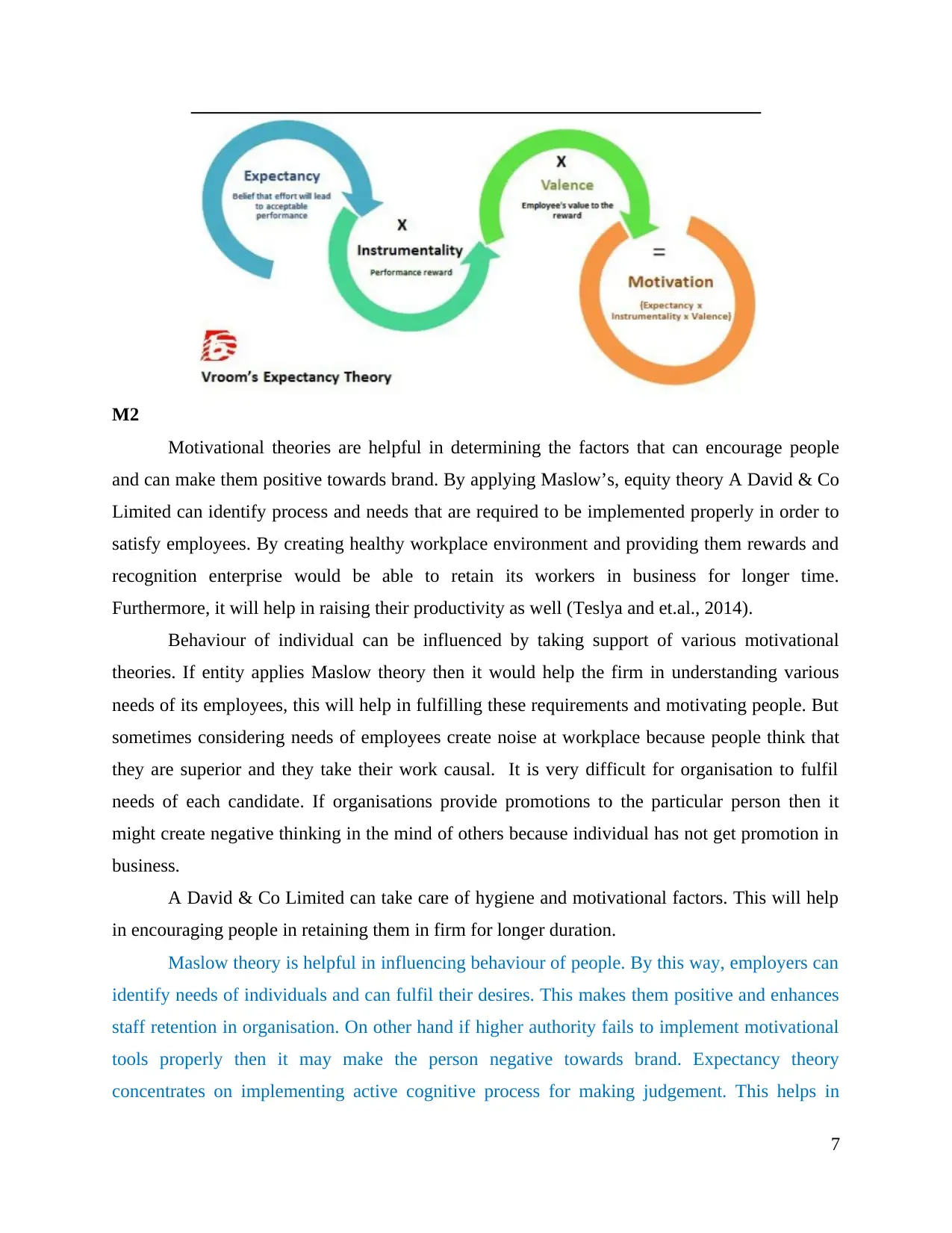
M2
Motivational theories are helpful in determining the factors that can encourage people
and can make them positive towards brand. By applying Maslow’s, equity theory A David & Co
Limited can identify process and needs that are required to be implemented properly in order to
satisfy employees. By creating healthy workplace environment and providing them rewards and
recognition enterprise would be able to retain its workers in business for longer time.
Furthermore, it will help in raising their productivity as well (Teslya and et.al., 2014).
Behaviour of individual can be influenced by taking support of various motivational
theories. If entity applies Maslow theory then it would help the firm in understanding various
needs of its employees, this will help in fulfilling these requirements and motivating people. But
sometimes considering needs of employees create noise at workplace because people think that
they are superior and they take their work causal. It is very difficult for organisation to fulfil
needs of each candidate. If organisations provide promotions to the particular person then it
might create negative thinking in the mind of others because individual has not get promotion in
business.
A David & Co Limited can take care of hygiene and motivational factors. This will help
in encouraging people in retaining them in firm for longer duration.
Maslow theory is helpful in influencing behaviour of people. By this way, employers can
identify needs of individuals and can fulfil their desires. This makes them positive and enhances
staff retention in organisation. On other hand if higher authority fails to implement motivational
tools properly then it may make the person negative towards brand. Expectancy theory
concentrates on implementing active cognitive process for making judgement. This helps in
7
Motivational theories are helpful in determining the factors that can encourage people
and can make them positive towards brand. By applying Maslow’s, equity theory A David & Co
Limited can identify process and needs that are required to be implemented properly in order to
satisfy employees. By creating healthy workplace environment and providing them rewards and
recognition enterprise would be able to retain its workers in business for longer time.
Furthermore, it will help in raising their productivity as well (Teslya and et.al., 2014).
Behaviour of individual can be influenced by taking support of various motivational
theories. If entity applies Maslow theory then it would help the firm in understanding various
needs of its employees, this will help in fulfilling these requirements and motivating people. But
sometimes considering needs of employees create noise at workplace because people think that
they are superior and they take their work causal. It is very difficult for organisation to fulfil
needs of each candidate. If organisations provide promotions to the particular person then it
might create negative thinking in the mind of others because individual has not get promotion in
business.
A David & Co Limited can take care of hygiene and motivational factors. This will help
in encouraging people in retaining them in firm for longer duration.
Maslow theory is helpful in influencing behaviour of people. By this way, employers can
identify needs of individuals and can fulfil their desires. This makes them positive and enhances
staff retention in organisation. On other hand if higher authority fails to implement motivational
tools properly then it may make the person negative towards brand. Expectancy theory
concentrates on implementing active cognitive process for making judgement. This helps in
7
⊘ This is a preview!⊘
Do you want full access?
Subscribe today to unlock all pages.

Trusted by 1+ million students worldwide
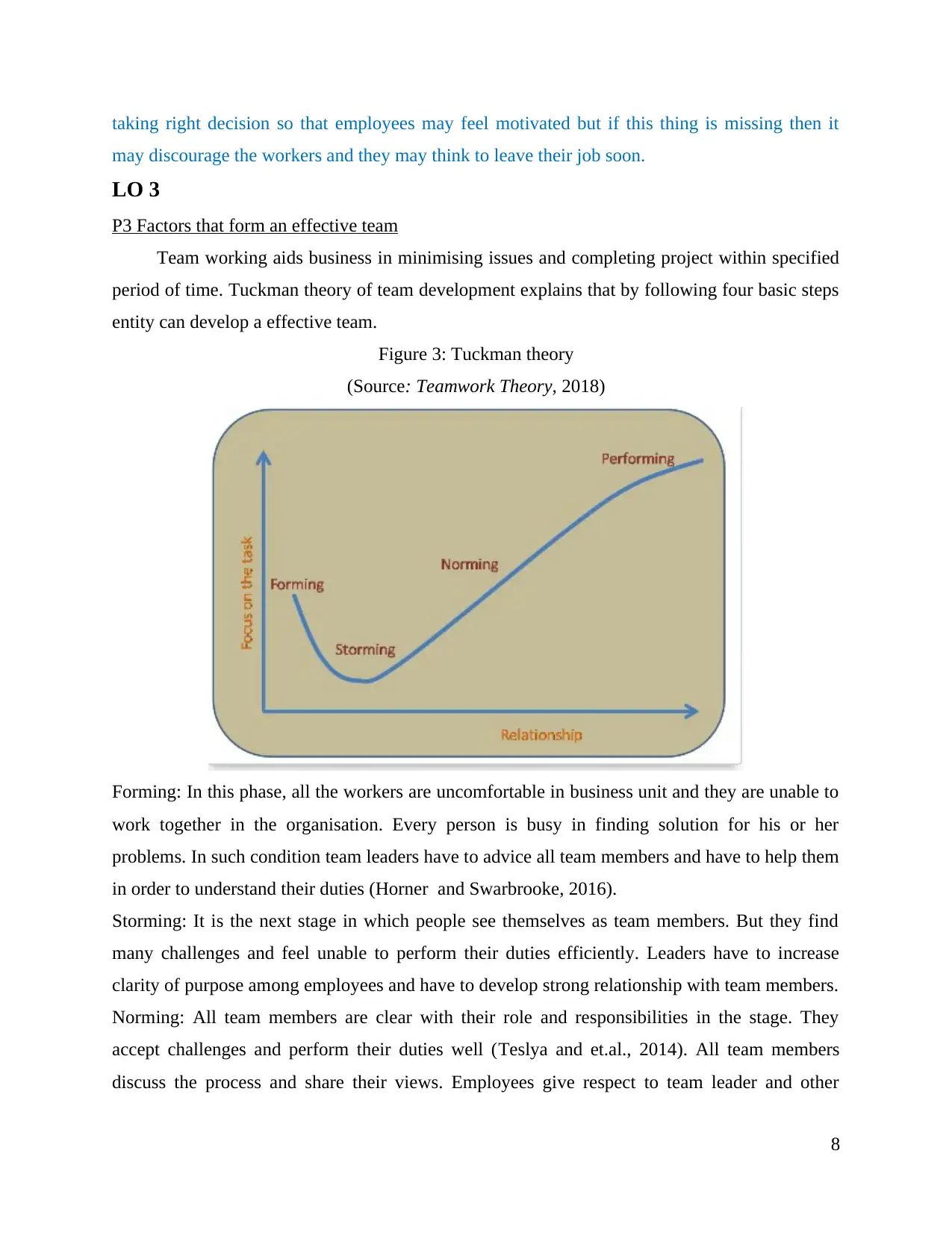
taking right decision so that employees may feel motivated but if this thing is missing then it
may discourage the workers and they may think to leave their job soon.
LO 3
P3 Factors that form an effective team
Team working aids business in minimising issues and completing project within specified
period of time. Tuckman theory of team development explains that by following four basic steps
entity can develop a effective team.
Figure 3: Tuckman theory
(Source: Teamwork Theory, 2018)
Forming: In this phase, all the workers are uncomfortable in business unit and they are unable to
work together in the organisation. Every person is busy in finding solution for his or her
problems. In such condition team leaders have to advice all team members and have to help them
in order to understand their duties (Horner and Swarbrooke, 2016).
Storming: It is the next stage in which people see themselves as team members. But they find
many challenges and feel unable to perform their duties efficiently. Leaders have to increase
clarity of purpose among employees and have to develop strong relationship with team members.
Norming: All team members are clear with their role and responsibilities in the stage. They
accept challenges and perform their duties well (Teslya and et.al., 2014). All team members
discuss the process and share their views. Employees give respect to team leader and other
8
may discourage the workers and they may think to leave their job soon.
LO 3
P3 Factors that form an effective team
Team working aids business in minimising issues and completing project within specified
period of time. Tuckman theory of team development explains that by following four basic steps
entity can develop a effective team.
Figure 3: Tuckman theory
(Source: Teamwork Theory, 2018)
Forming: In this phase, all the workers are uncomfortable in business unit and they are unable to
work together in the organisation. Every person is busy in finding solution for his or her
problems. In such condition team leaders have to advice all team members and have to help them
in order to understand their duties (Horner and Swarbrooke, 2016).
Storming: It is the next stage in which people see themselves as team members. But they find
many challenges and feel unable to perform their duties efficiently. Leaders have to increase
clarity of purpose among employees and have to develop strong relationship with team members.
Norming: All team members are clear with their role and responsibilities in the stage. They
accept challenges and perform their duties well (Teslya and et.al., 2014). All team members
discuss the process and share their views. Employees give respect to team leader and other
8
Paraphrase This Document
Need a fresh take? Get an instant paraphrase of this document with our AI Paraphraser
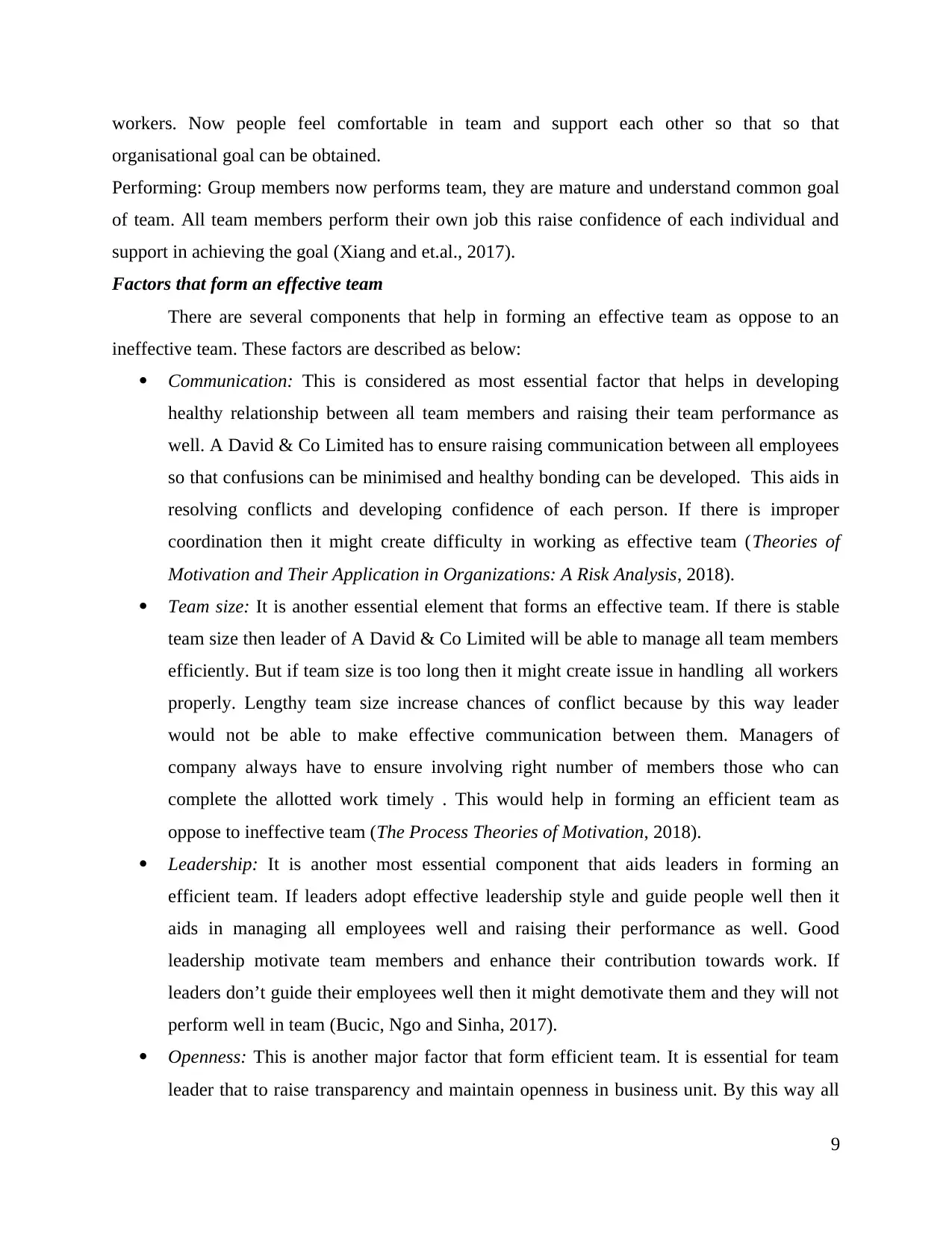
workers. Now people feel comfortable in team and support each other so that so that
organisational goal can be obtained.
Performing: Group members now performs team, they are mature and understand common goal
of team. All team members perform their own job this raise confidence of each individual and
support in achieving the goal (Xiang and et.al., 2017).
Factors that form an effective team
There are several components that help in forming an effective team as oppose to an
ineffective team. These factors are described as below:
Communication: This is considered as most essential factor that helps in developing
healthy relationship between all team members and raising their team performance as
well. A David & Co Limited has to ensure raising communication between all employees
so that confusions can be minimised and healthy bonding can be developed. This aids in
resolving conflicts and developing confidence of each person. If there is improper
coordination then it might create difficulty in working as effective team (Theories of
Motivation and Their Application in Organizations: A Risk Analysis, 2018).
Team size: It is another essential element that forms an effective team. If there is stable
team size then leader of A David & Co Limited will be able to manage all team members
efficiently. But if team size is too long then it might create issue in handling all workers
properly. Lengthy team size increase chances of conflict because by this way leader
would not be able to make effective communication between them. Managers of
company always have to ensure involving right number of members those who can
complete the allotted work timely . This would help in forming an efficient team as
oppose to ineffective team (The Process Theories of Motivation, 2018).
Leadership: It is another most essential component that aids leaders in forming an
efficient team. If leaders adopt effective leadership style and guide people well then it
aids in managing all employees well and raising their performance as well. Good
leadership motivate team members and enhance their contribution towards work. If
leaders don’t guide their employees well then it might demotivate them and they will not
perform well in team (Bucic, Ngo and Sinha, 2017).
Openness: This is another major factor that form efficient team. It is essential for team
leader that to raise transparency and maintain openness in business unit. By this way all
9
organisational goal can be obtained.
Performing: Group members now performs team, they are mature and understand common goal
of team. All team members perform their own job this raise confidence of each individual and
support in achieving the goal (Xiang and et.al., 2017).
Factors that form an effective team
There are several components that help in forming an effective team as oppose to an
ineffective team. These factors are described as below:
Communication: This is considered as most essential factor that helps in developing
healthy relationship between all team members and raising their team performance as
well. A David & Co Limited has to ensure raising communication between all employees
so that confusions can be minimised and healthy bonding can be developed. This aids in
resolving conflicts and developing confidence of each person. If there is improper
coordination then it might create difficulty in working as effective team (Theories of
Motivation and Their Application in Organizations: A Risk Analysis, 2018).
Team size: It is another essential element that forms an effective team. If there is stable
team size then leader of A David & Co Limited will be able to manage all team members
efficiently. But if team size is too long then it might create issue in handling all workers
properly. Lengthy team size increase chances of conflict because by this way leader
would not be able to make effective communication between them. Managers of
company always have to ensure involving right number of members those who can
complete the allotted work timely . This would help in forming an efficient team as
oppose to ineffective team (The Process Theories of Motivation, 2018).
Leadership: It is another most essential component that aids leaders in forming an
efficient team. If leaders adopt effective leadership style and guide people well then it
aids in managing all employees well and raising their performance as well. Good
leadership motivate team members and enhance their contribution towards work. If
leaders don’t guide their employees well then it might demotivate them and they will not
perform well in team (Bucic, Ngo and Sinha, 2017).
Openness: This is another major factor that form efficient team. It is essential for team
leader that to raise transparency and maintain openness in business unit. By this way all
9
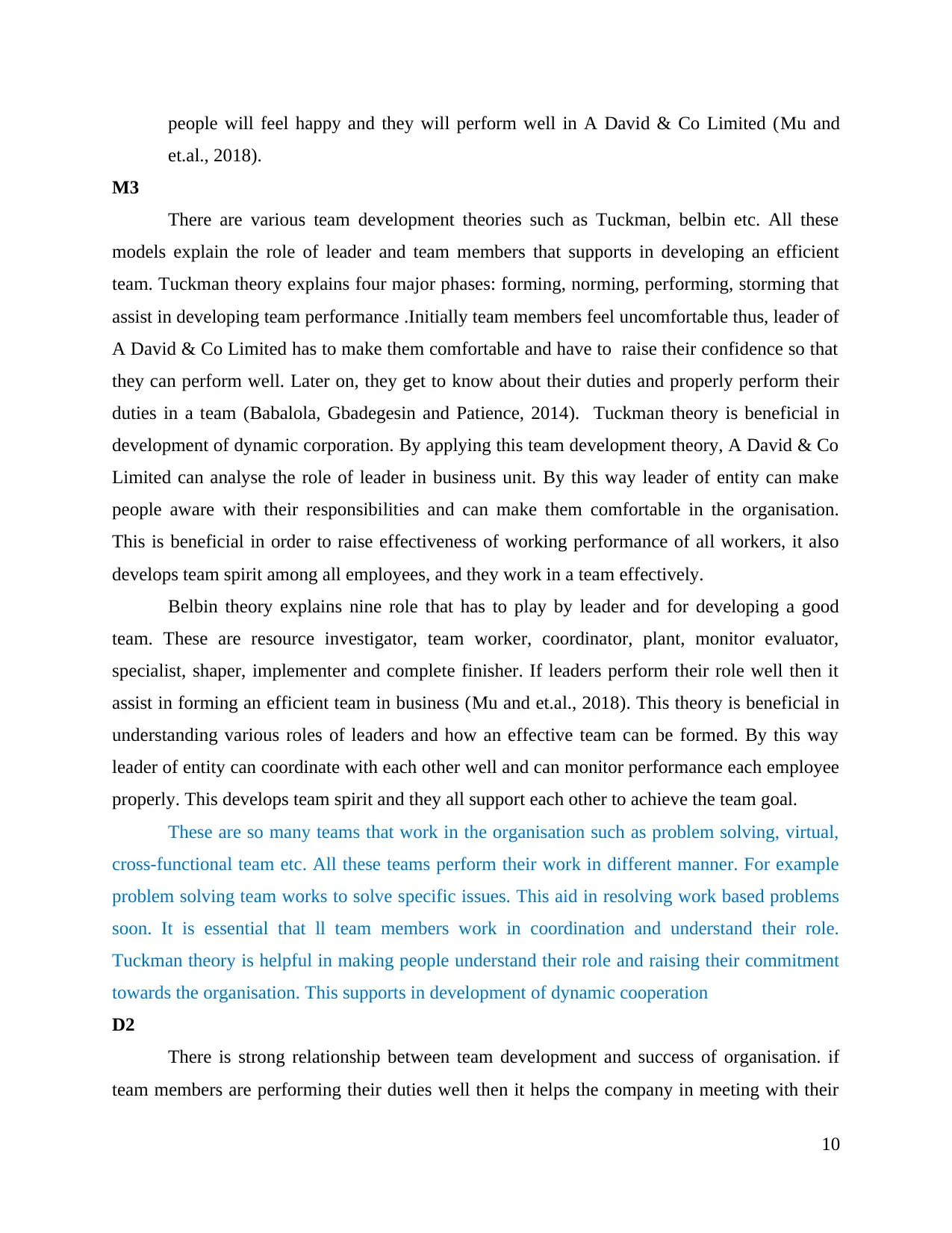
people will feel happy and they will perform well in A David & Co Limited (Mu and
et.al., 2018).
M3
There are various team development theories such as Tuckman, belbin etc. All these
models explain the role of leader and team members that supports in developing an efficient
team. Tuckman theory explains four major phases: forming, norming, performing, storming that
assist in developing team performance .Initially team members feel uncomfortable thus, leader of
A David & Co Limited has to make them comfortable and have to raise their confidence so that
they can perform well. Later on, they get to know about their duties and properly perform their
duties in a team (Babalola, Gbadegesin and Patience, 2014). Tuckman theory is beneficial in
development of dynamic corporation. By applying this team development theory, A David & Co
Limited can analyse the role of leader in business unit. By this way leader of entity can make
people aware with their responsibilities and can make them comfortable in the organisation.
This is beneficial in order to raise effectiveness of working performance of all workers, it also
develops team spirit among all employees, and they work in a team effectively.
Belbin theory explains nine role that has to play by leader and for developing a good
team. These are resource investigator, team worker, coordinator, plant, monitor evaluator,
specialist, shaper, implementer and complete finisher. If leaders perform their role well then it
assist in forming an efficient team in business (Mu and et.al., 2018). This theory is beneficial in
understanding various roles of leaders and how an effective team can be formed. By this way
leader of entity can coordinate with each other well and can monitor performance each employee
properly. This develops team spirit and they all support each other to achieve the team goal.
These are so many teams that work in the organisation such as problem solving, virtual,
cross-functional team etc. All these teams perform their work in different manner. For example
problem solving team works to solve specific issues. This aid in resolving work based problems
soon. It is essential that ll team members work in coordination and understand their role.
Tuckman theory is helpful in making people understand their role and raising their commitment
towards the organisation. This supports in development of dynamic cooperation
D2
There is strong relationship between team development and success of organisation. if
team members are performing their duties well then it helps the company in meeting with their
10
et.al., 2018).
M3
There are various team development theories such as Tuckman, belbin etc. All these
models explain the role of leader and team members that supports in developing an efficient
team. Tuckman theory explains four major phases: forming, norming, performing, storming that
assist in developing team performance .Initially team members feel uncomfortable thus, leader of
A David & Co Limited has to make them comfortable and have to raise their confidence so that
they can perform well. Later on, they get to know about their duties and properly perform their
duties in a team (Babalola, Gbadegesin and Patience, 2014). Tuckman theory is beneficial in
development of dynamic corporation. By applying this team development theory, A David & Co
Limited can analyse the role of leader in business unit. By this way leader of entity can make
people aware with their responsibilities and can make them comfortable in the organisation.
This is beneficial in order to raise effectiveness of working performance of all workers, it also
develops team spirit among all employees, and they work in a team effectively.
Belbin theory explains nine role that has to play by leader and for developing a good
team. These are resource investigator, team worker, coordinator, plant, monitor evaluator,
specialist, shaper, implementer and complete finisher. If leaders perform their role well then it
assist in forming an efficient team in business (Mu and et.al., 2018). This theory is beneficial in
understanding various roles of leaders and how an effective team can be formed. By this way
leader of entity can coordinate with each other well and can monitor performance each employee
properly. This develops team spirit and they all support each other to achieve the team goal.
These are so many teams that work in the organisation such as problem solving, virtual,
cross-functional team etc. All these teams perform their work in different manner. For example
problem solving team works to solve specific issues. This aid in resolving work based problems
soon. It is essential that ll team members work in coordination and understand their role.
Tuckman theory is helpful in making people understand their role and raising their commitment
towards the organisation. This supports in development of dynamic cooperation
D2
There is strong relationship between team development and success of organisation. if
team members are performing their duties well then it helps the company in meeting with their
10
⊘ This is a preview!⊘
Do you want full access?
Subscribe today to unlock all pages.

Trusted by 1+ million students worldwide
1 out of 17
Related Documents
Your All-in-One AI-Powered Toolkit for Academic Success.
+13062052269
info@desklib.com
Available 24*7 on WhatsApp / Email
![[object Object]](/_next/static/media/star-bottom.7253800d.svg)
Unlock your academic potential
Copyright © 2020–2026 A2Z Services. All Rights Reserved. Developed and managed by ZUCOL.





